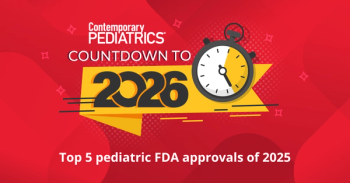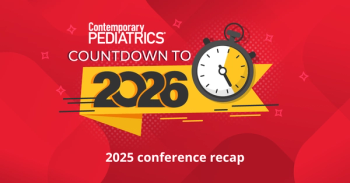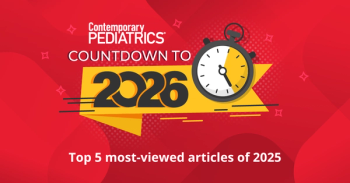
Rana Hamdy, MD, outlines being co-chair of a diagnostic stewardship symposium at the 2023 PAS meeting
Rana Hamdy, MD, discusses being co-chair of a diagnostic stewardship symposium at the 2023 Pediatric Academic Societies meeting, held in Washington, DC from April 27 to May 1.
Contemporary Pediatrics®:
Hi and thanks so much for watching. I'm Joshua Fitch, editor of Contemporary Pediatrics®.
Rana Hamdy, MD:
Hi, I'm Rana Hamdy. I'm a pediatric infectious diseases physician at Children's National [Hospital] in Washington, DC., and I'm the director of our antimicrobial stewardship program here.
Contemporary Pediatrics®:
Dr. Hamdy, thank you so much for taking the time to speak with us. You'll be attending the Pediatric Academic Societies meeting this year running through May 1 , right there in Washington, DC. I understand you're co-chairing a symposium on diagnostics, stewardship. Can you go into any specifics on the symposium and why you chose to help with this?
Hamdy:
Absolutely, yeah, we're really excited about this, it's taking place Sunday at 11:00 a.m. Eastern time. So it's a hot topic symposium on diagnostic stewardship, so diagnostic stewardship refers to the appropriate use of lab testing, and in this case, we're particularly thinking about microbiological testing, to help guide patient management including, you know, appropriate diagnosis and treatment to best optimize clinical outcomes and limit the spread of inappropriate antibiotic use and limiting the spread of antibiotic resistance. So, diagnostic stewardship is a really important component of antimicrobial stewardship really goes hand in hand with antimicrobial stewardship to ensure that we're making the correct diagnosis upfront and using our tests appropriately. So in the hot topic symposium, there will be presentations from various pediatric leaders, focusing on examples of successful diagnostic stewardship initiative, then various clinical settings, including the ICU setting, what is the best way and time to be using blood cultures and endotracheal aspirate cultures, the most appropriate ways to collect them when to collect them, and then also in the outpatient setting, specifically the urgent care setting with regard to interpretation of urinary samples for diagnosis of UTI, and then discussing challenges and appropriate use of molecular diagnostic.
Contemporary Pediatrics®:
With that being said, Dr. Hamdy, what do you foresee as some of the potential solutions to some of those issues you just mentioned? Or, I guess, a better way to streamline some of those topics?
Hamdy:
Yeah. So for each of those clinical settings, in the presentations, we want to help guide the clinician to be thinking about does the patient have signs or symptoms of an infectious process? Or can another process better explain the symptoms? Then what is the optimal diagnostic test available to evaluate this infectious process? How should the sample be collected to optimize results? So downstream from having having a result, which sometimes can be confusing, we want to be thinking about when's the best time to send it? What's the best time? What's the best kind of path to attend? And then once we have the result, how do we interpret it? So for example, you know, cultures from nonsterile site like endotracheal aspirate culture can sometimes lead to a lot of confusion and what they mean in the colonization and infection. And so we have leaders from from various different disciplines who have done some really great work quality improvement work to improve the system that we work in to help with our way of dying of using the task of collecting it appropriately and then of interpreting it. We're talking about making the appropriate diagnosis which underlies everything in what we do, right. So we often talk about medical errors and medical errors with the tip of the tip of the iceberg when we talk about diagnostic errors. So oftentimes, medical errors start with diagnostic errors, we have the right diagnosis, and maybe the wrong diagnosis happened because we use the wrong test. So really, sort of, we have to be thinking more, you know, more downstream and so making the right diagnosis to begin with. Then, we have we have great technology, we have great diagnostic tests we need to be using using them the right way.
Contemporary Pediatrics®:
Thank you, Dr. Hamdy, what are some of the other sessions if any specific are you looking forward to at the conference this year?
Hamdy:
You know, one of the things I love about PAS, so I'm an I'm a specialist, I'm an infectious disease pediatric infectious disease specialist, and what I love about PAS is it brings together all pediatricians from various different specialties and it's this great multidisciplinary, craft disciplinary convening, and so I as an infectious disease specialistreally take the opportunity in PAS to go to sessions that are not necessarily in my specialty. So the neonatology sessions and the Critical Care Medicine medicine session, and I'm particularly interested in the focus on on disparities and incorporating anti-racism in our clinical practice, which is one of the themes of PAS this year, which I'm really looking forward to.
Contemporary Pediatrics®:
That's a message we've heard echoed by a lot of people we've talked to about the conference. How nice is it to discuss these things interact with your peers, not at a work setting.
Hamdy:
I think this is where this is where it collaborations happen, and this is where we get a chance to meet each other at different institutions and different disciplines at these poster sessions, you know, exchange ideas and this is where so much of our brainstorming and collaborations happen. I usually take a notepad with me and I just have like, for every session I go to, there's just pages and pages of ideas, and then I go back home and try to incorporate so it's just a great place to learn from one another, hear what other people are doing at other institutions, bring those ideas back to our own institution, make connections, you know, hold on to those connections in the future. So I'm really excited looking forward to it.
Newsletter
Access practical, evidence-based guidance to support better care for our youngest patients. Join our email list for the latest clinical updates.








